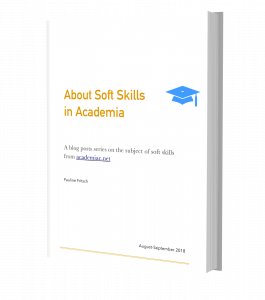Called “soft skills” they also come by “transferable skills,” which I find more explicit. Some people even define them as “real skills.”
The terminology “soft skills” try to separate them from “hard skills,” but things are never perfectly black&white. Let’s say that “hard skills” refers to your specific technical skills (how to perform experiment x, how to use a specific machine or software), whereas soft skills include those which you can apply in many different contexts: skills which you can transfer from one research project to another, from one academic position to another, or to a job outside of academia, or even at home (e.g. listening, emotional intelligence).
If you’re asking yourself what to do after your PhD (or postdoc or contract’s end). If you’re losing self-confidence. If you don’t know where to start to do something about the question “what am I doing with my life?”, stepping back from the technical work and identifying your soft skills is, I believe, the best way to start 🙂
This is exactly what happened to me when I was losing my self-confidence and my motivation for research. I could not even decide whether it would be better to quit my PhD or not, I was feeling trapped and worthless. Then I attended a soft skills workshop about … what soft skills are and how to identify them 🙂
The most important here is not how many soft skills one has, nor how good at them one is. The most important for our personal life and self-esteem is self-awareness. First, and above all, we need to become aware of all the situations in our academic life which allows us to use and develop these transferable skills.
- Soft skills first include all aspects of management: self-management, stress management, time management, project management; but also your presentation and writing skills, your reading and organizing literature information skills, your teaching skills. I think today these are well recognized and valued skills even among academics, and probably these are the skills for which it will be the easier to find training.
- Soft skills also include more personal and interpersonal skills (“people skills”) like creativity, self-motivation, adaptability, listening skills, diplomacy, empathy, honesty, open-mindedness, communication (when talking with someone, when writing an email), being independent but also being a good team member, mentoring, intercultural competence, and many more. For more, have a look at the references below👇
In this first short article, I just wanted to clarify what I am going to talk about in the next ones. Indeed, this is the start of my soft skills series!
- You already have more soft skills than you think and you can prove it.
- How to know which soft skills training is best for my career?
- Where can I find soft skills training in academia?
- Lack of communication about soft skills training programs in academia.
- Do senior scientists acknowledge the importance of early soft skills training?
I’ve put together these 6 articles in one PDF for you to read the whole series easily, you can subscribe here to get it!

Thanks for reading this post today and stay tune! 🙂
👉 More reading:
- Which soft skills for research career on StackExchange
- Let’s stop calling them ‘soft skills’ on Medium
- Joint Skills Statement by the UK Research Council (2001)
- Researcher Development Statement (2010) by the Vitae programme (UK) see my second article for how to use these statements




In this article I didn’t list many possible soft skills because there are just too many, it would be super long and it would never be truly complete.
However if you are looking for more examples or for detailed lists of important soft skills for academics, look at the references provided in the “more reading” section and at the second article of the series 🙂
Another question I ask myself: should we call it soft skills or transferable skills? I like that transferable skills sounds more like a concrete/useful thing than a soft skill. If someone never heard that expression before, he/she might wonder how a skill can be soft? 🤔 However, I fear that today, for many academics, the expression transferable skills refers to skills that (they think) are useful only for non-academic jobs… Then soft skills sounds more neutral. Therefore, for the moment I still prefer using soft skills and I hope to spread the idea that these skills are super useful for academics! 🙂